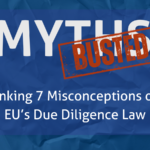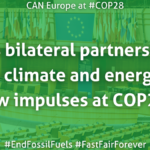The world’s governments agreed at the Durban climate meeting in 2011 two things: first that they would increase their short-term climate ambition; and, second that in 2015 they would agree a new global climate agreement in Paris. The Warsaw meeting is a step along the way to both of these objectives.
What will Warsaw achieve?
Warsaw is a step on the way to Paris – but it’s an important step. The key things it must achieve are:
– Agree a roadmap between now and Paris that lays out clear milestones. Key amongst these is the UN Secretary General, Ban Ki-moon, Leader’s Summit in September 2014 which is where countries must first put on the table ambitious mitigation and finance pledges.
– Agree that the mitigation and finance pledges, that will be part of the 2015 agreement, will be assessed and revised to ensure that they are enough to keep warming below 1.5 degrees, and that the effort is shared fairly;
– Agree a set of requirements for information accompanying proposed mitigation commitments and ensure criteria for transparency, quantification, comparability, verifiability and adequacy;
– Agree that all countries will increase efforts to reduce emissions in the short term, before 2020 – at the latest by June next year (at a Ministers meeting in Bonn, Germany).
– Developed countries need to make it clear how and when they will live up to the finance pledges they’ve made in the past. There is currently almost no money on the table to help poor countries reduce their emissions or cope with the devastating impacts of climate change. This needs to change urgently.
– The international community must agree how we’ll help the poorest countries who will soon face climate impacts that can’t be adapted to – rising sea levels reclaiming land; desertification making land un-farmable. This means establishing a Loss and Damage Mechanism to become operational by 2015.
– For a full explanation of these points, and other things that it’s important Warsaw achieve, see Warsaw: On the Road to Paris, full English Version
What is the EU’s role?
The EU has been instrumental in many of the successes at the UNFCCC, such as the initial offers for the Kyoto Protocol and the adoption of the 2°C target. COP 21 in Paris will be a rare opportunity for the world to move forward together on climate action. In order to catalyze global climate action, active and ambitious input from the European Union over the coming two years will be crucial.
At COP19 the EU should:
Work to agree an equitable approach to effort sharing. The failure to develop an equitable approach to sharing the efforts of mitigation and adaptation amongst countries has been a barrier to reaching an adequate agreement. Countries are concerned that they will be asked to do more than is their fair share, and fear that other countries will free-ride off their efforts. The EU is in a position that allows it to play a constructive role in facilitating such an agreement. In our opinion this can be best done through a process of exploring a number of equity principles and indicators, such as adequacy, responsibility, capability, and development and adaptation need. An effort sharing proposal from the EU would help significantly to take this discussion forward.
Scale up climate funding from 2013 to 2020. We call for the EU to set out – in a transparent and comparable manner – what climate finance the EU will be providing over 2013-2015, including pledges to Adaptation Fund, Least Developing Country Fund and the Green Climate Fund. Developing countries need a clear indication that at least 50% of all public finance will be allocated for adaptation. COP19 has to agree and deliver a collective and ambitious finance roadmap for scaling up climate funding from 2013 to 2020 to USD 100bn, hence Ministers must come to Warsaw with a clear mandate.
Agree a timetable for new adequate Post-2020 (2025) mitigation commitments in 2014. We warmly support the EU’s proposal for stepwise approach involving early formulation and revision of new mitigation commitments for all. The EU’s best leverage to ensure a successful global agreement in 2015 will be its domestic post-2020 climate and energy policy. This must reflect the EU’s fair share of the global effort and to be agreed early in 2014, before the Ban Ki-moon Summit.
Adopt a 40% target for 2020. The EU’s failure to enhance domestic climate action lessens the EU’s credibility internationally. The EU’s 20% target for 2020 has been achieved already, almost eight years in advance, and it is on a pathway close to 30% domestic reductions by 2020. It is very regrettable that the EU is refusing both to make these reductions legally binding domestically and internationally, as well as to ramp up efforts and adopt a 40% target for 2020.



